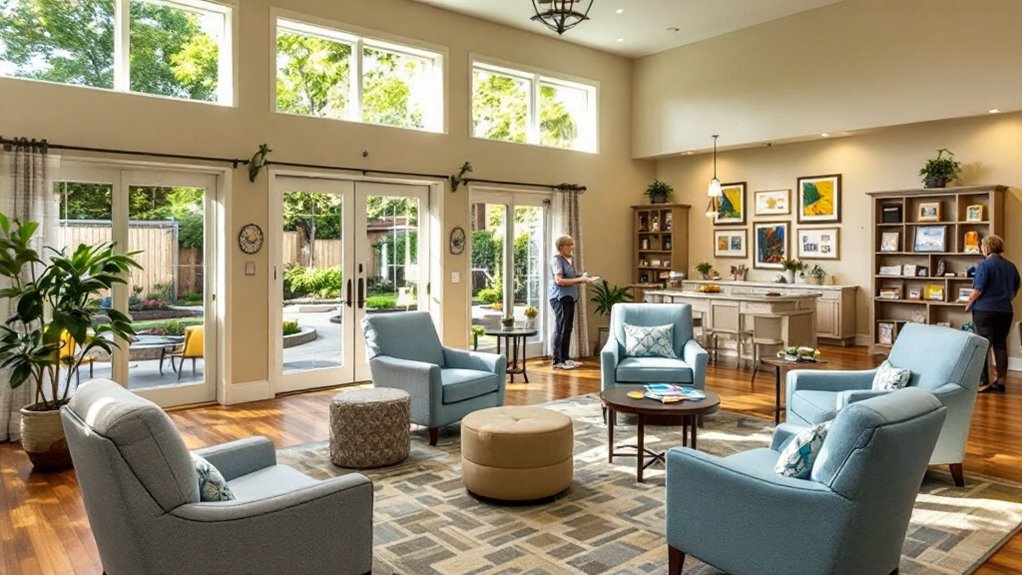Memory care facilities provide extensive residential support specifically designed for individuals with Alzheimer's disease and other forms of dementia, serving approximately 800,000 Americans. You'll find secure environments with controlled access points, specially trained medical staff maintaining low resident-to-staff ratios, and evidence-based therapeutic programs including cognitive stimulation and music therapy. These specialized centers implement continuous monitoring protocols and personalized care strategies while offering structured daily activities. Further exploration reveals how these facilities address complex cognitive healthcare needs through multifaceted approaches.

As the global prevalence of Alzheimer's disease continues to rise, with an estimated 6.7 million Americans living with the condition in 2023, memory care facilities have emerged as specialized healthcare environments designed to address the complex needs of individuals experiencing cognitive decline.
These facilities provide thorough, long-term skilled care services specifically tailored for patients with Alzheimer's disease, other forms of dementia, and brain injuries, operating within standalone centers, assisted living communities, nursing homes, and continuing care retirement communities.
You'll find that memory care facilities implement sophisticated security measures, including secured entrances, advanced monitoring systems, and specially designed spaces that minimize wandering risks while maximizing resident safety.
The facilities' structured environments incorporate evidence-based routines and activities that have demonstrated efficacy in reducing stress and enhancing quality of life for individuals with cognitive impairments. The facilities maintain a low staff-to-resident ratio to ensure comprehensive support and personalized attention for each resident.
When you're evaluating the need for memory care, several key indicators warrant consideration, including persistent daily confusion, inability to manage personal care, increased agitation or aggressive behaviors, and elevated safety risks such as falls or wandering episodes. These symptoms typically develop gradually as the disease progresses over time.
The facilities employ specially trained staff members who possess expertise in managing dementia-related behaviors and implementing personalized care strategies based on detailed assessments of each resident's condition. Dedicated caregivers provide daily living assistance to maintain residents' dignity and independence.
The multi-disciplinary approach to care integrates services from healthcare professionals, including physicians, physical therapists, and psychiatrists, ensuring thorough support for residents' evolving needs.
Memory care facilities provide sophisticated medication management systems and implement specialized activities, including cognitive stimulation programs, music therapy sessions, and adapted physical exercise regimens designed to maintain cognitive function and physical well-being.
Your loved one will receive continuous monitoring through regular evaluations that assess disease progression and care plan effectiveness, with modifications implemented as needed.
The facilities maintain strict health safety protocols while offering cognitive activities designed to potentially slow decline, such as structured memory games and social interaction programs that combat isolation, all within a secure environment that prioritizes both physical safety and emotional well-being.
Frequently Asked Questions
Can Medicare or Medicaid Cover the Costs of Memory Care Facilities?
Medicare provides limited coverage for memory care, primarily covering short-term skilled nursing care up to 100 days and medically necessary services, but won't cover long-term residential costs.
Medicaid, however, can cover memory care facility expenses if you've depleted your assets and meet your state's eligibility requirements.
You'll need to verify specific coverage details with your state's Medicaid office, as benefits vary geographically.
How Do I Know When It's the Right Time to Transition to Memory Care?
You'll need to evaluate several critical indicators: inability to safely manage daily tasks, frequent wandering or falls, medication mismanagement, and significant personality changes or social withdrawal.
When your loved one experiences multiple safety incidents or requires round-the-clock supervision, it's time to reflect on memory care.
Track behavioral changes, document safety concerns, and consult healthcare providers to make an evidence-based decision about moving to a specialized facility.
What Qualifications Should I Look for in Memory Care Facility Staff?
Look for staff with specialized dementia care certifications and extensive training in Alzheimer's management.
You'll want caregivers who've completed state-mandated continuing education programs and demonstrate expertise in behavior management, fall prevention, and person-centered care techniques.
Verify that facility personnel maintain current certifications, possess documented experience with memory care patients, and understand Medicare/Medicaid regulations.
Additionally, make certain staff members show proficiency in emergency response protocols and infection control standards.
Are Pets Allowed to Visit Residents in Memory Care Facilities?
Most memory care facilities allow pet visitations, though specific policies vary by location and facility protocols.
You'll find that 82% of facilities permit scheduled pet visits, while approximately 45% allow residents to keep pets permanently.
When planning visits, you'll need to provide current vaccination records, schedule visits during designated hours, and guarantee your pet meets the facility's size and temperament requirements.
How Often Can Family Members Participate in Memory Care Activities?
You can participate extensively in memory care activities, with research indicating families typically visit 15-20 times monthly.
Most facilities welcome family involvement in structured programs, including cognitive exercises, art therapy, and social activities.
You'll need to coordinate with staff to align participation with the facility's schedule while respecting your loved one's routine and energy levels throughout the day.









